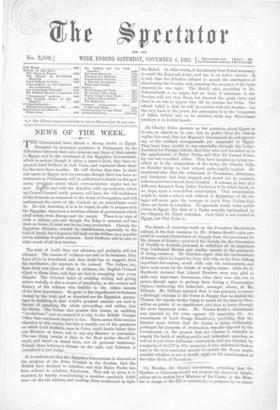The trial of Arabi does not advance, and probably will
not advance. The masses of evidence are said to be immense, they have all to be translated, and then Arabi has to suggest, from his recollection, the answers to his counsel. The Judges, too, have their own ideas of what is evidence, the English Counsel object to those ideas, and days are lost in wrangling over every dispute. The Oriental habit of avoiding writing and giving orders verbally is also a source of perplexity, as the animus and history of the witness who testifies to the orders become of the first importance. So great is the impediment to business caused by the trial, and BO absorbed are the Egyptian person- ages in watching it, that Arabi's greatest enemies are now in favour of quashing the whole proceeding, and exiling him by decree. The Sultan also presses this course, as avoiding " revelations," and we suspect it is only to the British Foreign Office that continued inquiry is due. There seems little serious objection to this course, but this is exactly one of the questions on which Lord Dufferin, once in Cairo, could decide better than any Minister at home, not to say any Member or journalist. The one thing certain is that in the East justice should be rapid, and based on broad facts, not on personal testimony. Nobody there believes a witness on his oath, and Solomon is considered a just judge.


































